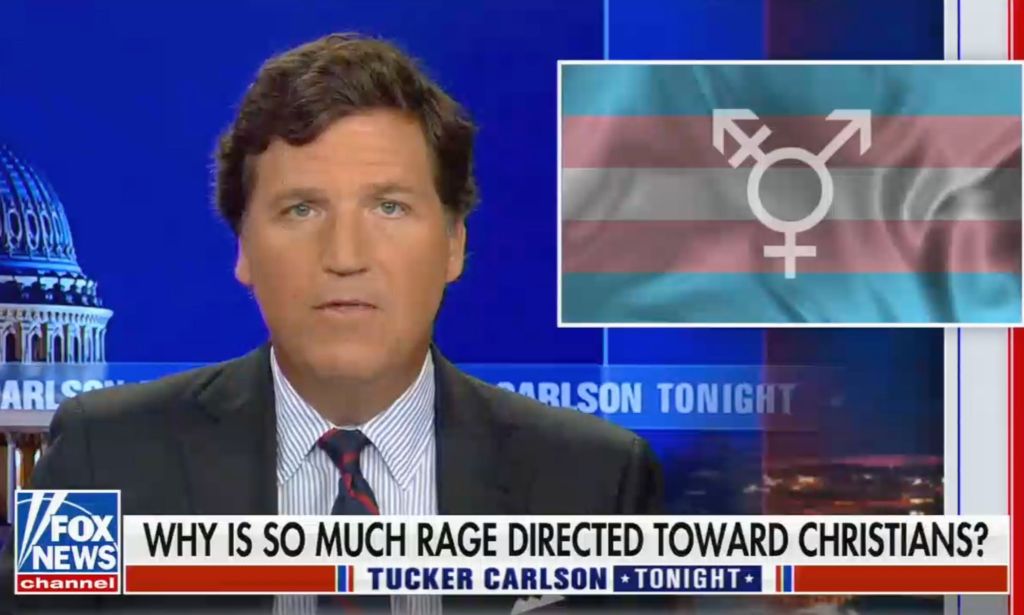Fox News’ loudest anti-trans voice falls silent – but ‘dangerous’ legacy lives on
Fox News taking Tucker Carlson off the air means that one of the loudest anti-trans voices in US media falls silent – for now. But his anti-LGBTQ+ legacy will continue to reverberate.
Carlson was Fox News’ top-rated and most-watched host, and he’s been credited with setting the agenda for US conservatives from coast to coast.
Night after night, millions tuned in to watch Carlson rant and paint a dystopian picture of a US where conservatives are under attack from the encroaching ‘woke’ left.
Over the years his eponymous show aired, he raged against the LGBTQ+ community, embraced racist conspiracy theories and pushed an increasingly far-right agenda on his viewers.
His departure from the network came as a shock to many. In a terse statement released Monday (24 April), Fox News said it and Carlson agreed to “part ways” effective immediately. It’s been reported that the decision was made by Fox chair Rupert Murdoch.
It means that Carlson made his final appearance, apparently unknowingly, on Friday, bringing to a quiet close an era of right-wing hate and ‘radicalisation’.
Media Matters for America described Carlson as the “engine that made the modern incarnation of Fox News run”.
It said he “worked to radicalise the Republican party in the direction of its most dangerous, authoritarian elements”.
“Carlson has been the face of the network since at least the 2020 election, with executives counting on his personal connection to viewers to keep them coming back as former president Donald Trump receded from the national stage,” Media Matters added.
“He used that opportunity to focus the network (and through it, the GOP) on his own particular obsessions, like the ‘great replacement’ conspiracy theory, anti-trans invective and support for authoritarian regimes in Russia and Hungary.”
Tucker Carlson was at the forefront of anti-LGBTQ+ rhetoric and attacks on trans rights
Among Carlson’s most vehemently pursued talking points was the idea that white, cisgender, heterosexual people are under attack in the US. It’s a common bigoted topic pushed by the right-wing to abuse anyone who deviates from their perceived norm.
In 2017, Carlson spent several minutes on his show attempting to minimise the impact of slavery in the US by saying he wouldn’t “judge the past by the standards of the present”.
Fast forward to 2020, he took to the air to call the Black Lives Matter protests an “insidious” attempt to “challenge Western civilisation itself”. He also called workplace anti-bias training “poison” and reverse racism.
Tucker Carlson has also been at the forefront of the modern attack on gender-affirming healthcare by the right-wing.
Over the years he appeared on Fox News, Carlson hosted a lengthy list of anti-trans guests, who espoused hateful talking points. He’s also devoted hearty chunks of his on-air career to personally attacking the lives of trans people.
In 2021, he hosted a guest who falsely suggested gender-affirming healthcare for trans youth allows people to “basically molest and abuse children”. Carlson agreed before falsely characterising such medical treatment as “genital mutilation”.
In reality, gender-affirming healthcare is widely accepted, effective and life-saving treatment supported by major medical professional organisations worldwide.
Carlson called trans people a “challenge to the perpetuation of the species” and described trans youth as “grotesque” and a “nationwide epidemic”.
He depicted healthcare officials providing gender-affirming care as “criminals” and said Boston Children’s Hospital was “playing the victim” after it received bomb threats over such care.
Tucker Carlson used mass shootings to attack drag queens and trans people
Amid right-wing attacks against drag, Tucker Carlson said on Fox News that kid-friendly drag events were attempts to “indoctrinate and sexualise children”. In another segment, he claimed it’s “not that unfair” to accuse drag queens of “being creepy with kids”.
He also blasted what he described as the “sexualisation” of children by teachers and urged parents to “fight back” against discussions of LGBTQ+ issues in schools.
Carlson responded to the horrific Colorado Springs shooting, which killed five people after an attack on an LGBTQ+ nightclub, by ranting about gender-affirming healthcare and drag.
He went on another deeply disturbing diatribe targeting the trans community following the tragic shooting at the Covenant School in Nashville, Tennessee, which left six dead, including three children.
The host falsely claimed on his Fox News show that the school shooting “happened because of a deranged and demonic ideology that is infesting this country with the encouragement of people like Joe Biden”.
He also labelled trans people as the “natural enemy” of Christianity as he alleged that the “trans movement is targeting Christians”.

What will happen to Tucker Carlson after his Fox News exit?
Tucker Carlson became the effective face of right-wing Fox coverage after replacing Bill O’Reilly, who was dismissed in 2017 and had his own history attacking the LGBTQ+ community.
Once O’Reilly stepped away for good from the mic, his name, reputation and sway in the right-wing crowd faded into obscurity. Carlson may face a similar fate.
The decision to oust the controversial host reportedly came from Fox owner Rupert Murdoch, and it was connected to a lawsuit filed against Carlson by a former staffer.
It also came just a short while after Fox settled a defamation lawsuit with Dominion Voting Systems for $787.5m. The lawsuit centred on Fox airing false claims that the presidential election was stolen after former president Donald Trump’s 2020 loss.
Filings in the case featured a lengthy list of messages from Carlson disparaging the media group’s news division and management, revealed his feelings about Trump and demonstrated his scepticism of the ‘stolen election’ conspiracy theory.
